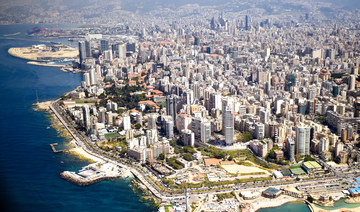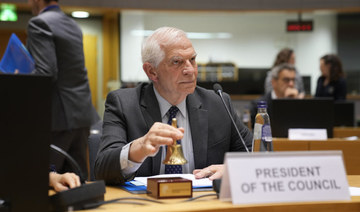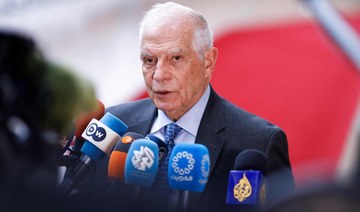BEIRUT: Authorities are battling to prevent “a social explosion” among Palestinian refugees crammed into camps in Lebanon, a top official has revealed.
Fathi Abu Al-Ardat, secretary of Palestine Liberation Organization (PLO) factions in Lebanon, told Arab News that urgent measures were being put in place to try and stop the “crisis” situation getting out of control.
“Conditions in Palestinian refugee camps in Lebanon are very difficult due to the economic crisis facing the country, and we are trying to delay a social explosion in the camps and working on stopgap solutions,” he said.
And Dr. Hassan Mneimneh, the head of the Lebanese-Palestinian Dialogue Committee (LPDC), said: “More Palestinian refugees from the camps in Lebanon are immigrating. Embassies are receiving immigration requests, and Canada is inundated with a wave of immigration because its embassy has opened doors to applications.”
According to a population census conducted in 2017 by the Central Administration of Statistics in Lebanon, in coordination with the Palestinian Central Bureau of Statistics (PCBS), there are 174,422 Palestinian refugees in Lebanon spread across 12 camps and nearby compounds.
Mneimneh insisted the figure was accurate despite the UN Relief and Works Agency (UNRWA) estimating there to be 459,292 refugees in the country. He said: “The census we had conducted refers to the current reality in Lebanon.”
He added that he feared “increased pressure on European donor countries over UNRWA in the coming days after the unilateral implementation of the ‘Deal of the Century’ (the US peace plan for the Middle East) by Israel.
“Israel’s goal is to undermine UNRWA’s mission as a prelude to ending the Palestinian cause and, thus, preventing the return of Palestinians.”
Mneimneh held a meeting on Wednesday with two Lebanese and Palestinian action groups in Lebanon to discuss Palestinian asylum issues in light of the American peace plan. There were no representatives of Hezbollah or Hamas present at the talks.
He said: “This deal kick-starts an unusual stage that carries the most serious risks not only to the Palestinian people and cause, but also to the other countries and entities in the Arab region.
“The first of these is Lebanon, which senses the danger of this announcement in view of the clauses it contains to eliminate the Palestinian cause, including the refugee issue and the possibility of their settlement in the host countries.”
Al-Ardat said: “Palestinian refugees have no choice but to withstand the pressures on them to implement the so-called ‘Deal of the Century.’ What is proposed is that we sell our country for promises, delusions, and $50 billion distributed to three countries. Palestine is not for sale.”
He pointed out that “the camps in Lebanon resorted to family solidarity in coordination with the shops in the camps. Whoever does not have money can go to the shop after two (2 p.m.) in the afternoon and get vegetables for free.
“We have been securing 7,000 packs of bread to distribute in the camps and buying the same amount to sell the pack at 500 liras. But this does not solve the problem.”
He added: “The PLO leadership continues to perform its duty toward the refugees and, until now, we have not been affected by the restrictions imposed by banks in Lebanon, and refugees are still receiving medical treatment.
“However, our concern now is that Palestinian refugees do not starve, taking into account all the indications that the situation in Lebanon will not improve soon.
“Twenty percent of the Palestinians in Lebanon receive wages either from UNRWA — as they work there — or from the PLO because they are affiliated with the factions, but 80 percent are unemployed and have no income.”
The meeting hosted by Mneimneh agreed “the categorical rejection of the ‘Deal of the Century’ because it means further erasing the identity existence of the Palestinian people as well as their national rights, especially their right to return and establish their independent state.
“It also means assassinating the Palestinian peoples’ legitimate rights and supporting Israel’s usurpation of international justice and 72 years of Arab struggle.
“The deal includes ambiguous, illegal and immoral approaches that contradict all relevant UN and Security Council resolutions, especially with regard to the establishment of the Palestinian state on the Palestinian territories occupied in 1967 and the inalienable right of Palestinian refugees to return to their homeland and establish their state with Jerusalem as its capital,” a statement on the meeting added.
“UNRWA must remain the living international witness to the ongoing suffering and tragedy of the Palestinian people, and UNRWA must continue to receive support.”
Attendees at the talks also recommended “improving the conditions of the Palestinian refugees in Lebanon to strengthen the elements of their steadfastness until they return.” This was “based on the Unified Lebanese Vision for the Palestinian Refugees Affairs in Lebanon document, which includes the right to work.”




























